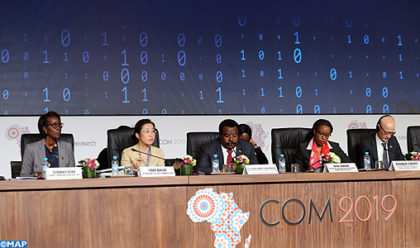Morocco Pan African Ministerial Meeting calls for concerted effort to move Regional Integration to next level.
MARRAKESH, Morocco, March 24, 2019/APO: The African Regional Integration Index (ARII) has revealed regional integration is not moving at the desired pace.
The Index set up to monitor and evaluate the status of economic integration among African countries and to provide basis for member States to track their progress has nevertheless singled out the Southern African Development Community (SADC) trading block as doing slightly better.
While the African Continental Free Trade Area (AfCFTA) remains a momentous milestone for Africa, preliminary findings of the upcoming 2019 African Regional Integration Index released at the Conference of Ministers in Morocco on Saturday, March 23, 2019, indicates regional integration in Africa is still low.
The 52nd session of the Conference of African Ministers of Finance, Planning and Economic Development is taking place at the Palmeraie Golf Palace in Marrakech, Morocco, where the Committee of Experts meeting commenced on Wednesday, 20 March ending on Friday, 22 March 2019.
The ministerial segment of the Conference of Ministers was schedule to take place on Monday, 25 and Tuesday, 26 March 2019.
The findings reveal that the Southern African Development Community (SADC) is the most integrated region in terms of trade, with South Africa as the most integrated country on the continent.
In the five areas that were analysed – trade integration, regional infrastructure, productive integration, free movement of people and macroeconomic integration – South Africa topped the ranking; with South Sudan as the least integrated country mainly because of its modest performance in regional infrastructure and financial integration.
Meanwhile, integration in services, contributed more than 53% of the continent’s GDP, but ratification of the protocol on the free movement of people has been slow, despite the 2016 launch of the Common Electronic Biometric African Passport, and the AU Protocol on Free Movement of Persons.
The Continent’s large infrastructure deficit remains a major hindrance to intra-regional trade.
“It is up to Africans themselves to ensure that the initiative benefits them through hard work and efficient implementation of the mechanisms of the CFTA,” says David Luke, Co-ordinator of the African Trade Policy Centre, Regional Integration and Trade Division of Economic Commission of Africa (ECA).
Leila Mokadem, Country Manager and Resident Representative in Morocco for the African Development Bank (AfDB) added that despite the “tremendous” political support for the ACTFA, there are still major challenges ahead in terms of implementation and pushing the agenda forward to meet the goal of increasing intra-African trade to 25% by 2023 from between 15% and 18% currently.
She cited weak productive capacity in Africa, high production costs, large infrastructure deficits and other challenges that affect Africa’s competitiveness. The problem is compounded by the number of small markets and the fact that 16 countries are landlocked.
The final ARII and the accompanying Assessing Regional Integration in Africa IX Report will be released later in the year.
The Economic Commission for Africa (ECA) has meanwhile distributed a report which calls uponAfrican nations to move into the next level on the question of regional integration. The ECA report distributed from Addis Ababa says the African Development Bank (AfDB), the government of Morocco and COMESA have together called for a single strategy and commitment from all partners to ensure that regional integration moves into the next phase, which is implementation.
On the margins of the 52nd session of conference of Ministers being held from 20-26 March 2019, in Marrakech, Morocco the conveners briefed officials of the ministries of trade, finance, industry, economic development and planning, private sector, civil society organizations, academia, development partners and regional and international organizations on the recommendations of the Economic Commission for African regional integration flagship reports, which included one on “Assessing regional integration in Africa (ARIA) IX: next steps for the African Continental Free Trade Area,” and “The African Regional Integration Index report (2019)”.
The objectives of this event were to provide key messages and recommendations resulting from the African regional integration research and engage member States in considering how best to approach the AfCFTA phase II negotiations.
The side event was chaired by Mr. David Luke, Coordinator of the African Trade Policy Center (ATPC), Regional Integration and Trade Division (RITD) who called on all member countries to ratify the AfCFTA so that all efforts can now focus on implementation of the agreement. He said that the ground work has been set by the report launched on Wednesday, which set the tone for further discussions.
The report assesses current trends of regional integration in Africa, specifically on progress made in the areas of macroeconomic convergence, trade, investment and markets, free movement of people and infrastructure. including those from landlocked countries in the context of the Vienna Declaration and Program of Action, governance, peace and security.
The call was echoed by Ms. Leila Mokadem, Country manager and Resident representative of the African Development Bank (AfDB) in Morocco who recommended that the way forward is “to ensure that funding institutions pump resources into infrastructure development to counter week production structures, the solution is for Africa to work together under a continental strategy.”
She further alluded to the importance of e-commerce and the report recommendations on the growing importance of digital trade, as business conducted through e-commerce platforms and e-payment systems continue to grow.
Mr. Kipyego Cheluget, Assistant Secretary General for the Common Market for Eastern and Southern Africa (COMESA) emphasized the importance of developing free trade instruments that promote free movement of people and goods. This should be accompanied by effective monitoring and evaluation strategies as stipulated in the 2019 edition of the African Regional Integration Index. whose objective is to monitor and evaluate the status of economic integration among African countries.
The report also provides a basis for member States to track their progress within their respective regional economic communities and within the continent. The preliminary results of the 2019 report indicate that regional integration in Africa remains low across the five dimensions that are analyzed: trade integration, regional infrastructure, productive integration, free movement of people and macroeconomic integration.
The event ended with a question and answer session on regional integration dynamics in Africa and specific policy recommendations on how to support the regional integration process. The panelists also outlined the next steps for implementing the AfCFTA agreement and specific recommendations on options for the AfCFTA phase II negotiations.





